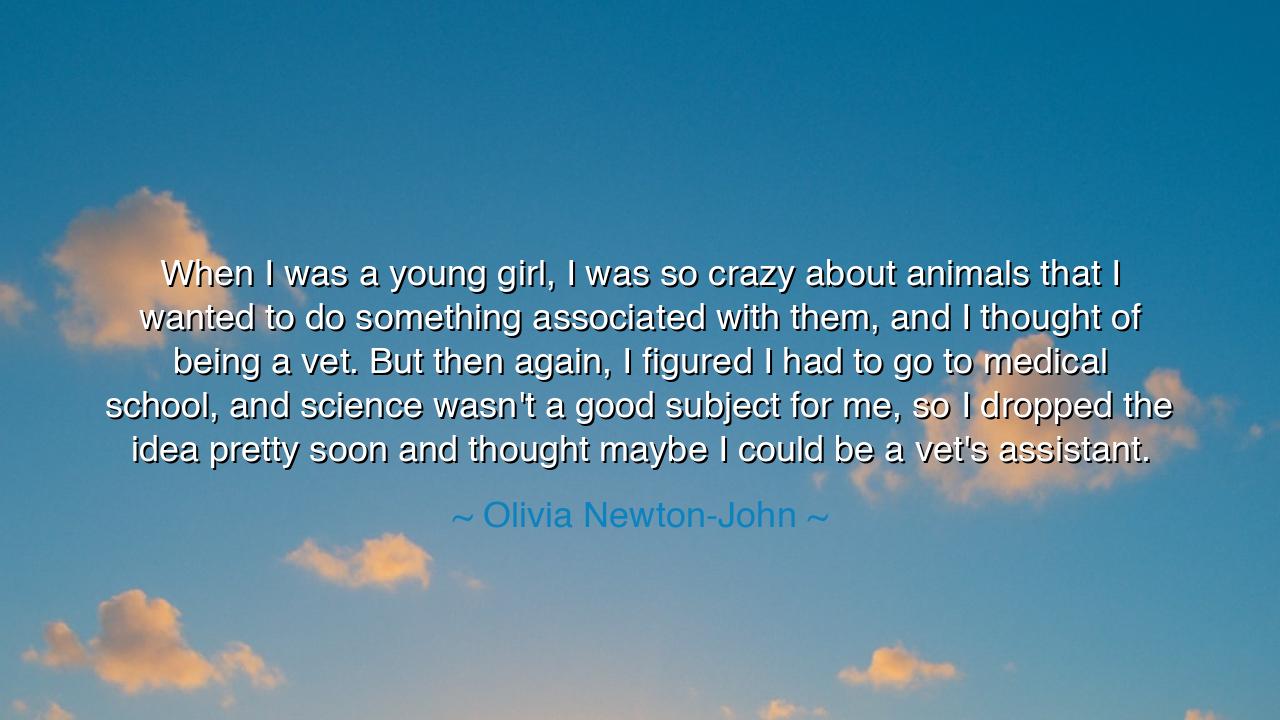
When I was a young girl, I was so crazy about animals that I
When I was a young girl, I was so crazy about animals that I wanted to do something associated with them, and I thought of being a vet. But then again, I figured I had to go to medical school, and science wasn't a good subject for me, so I dropped the idea pretty soon and thought maybe I could be a vet's assistant.






The words of Olivia Newton-John—“When I was a young girl, I was so crazy about animals that I wanted to do something associated with them, and I thought of being a vet. But then again, I figured I had to go to medical school, and science wasn't a good subject for me, so I dropped the idea pretty soon and thought maybe I could be a vet's assistant.”—are tender and human, revealing the inner wrestling of youth between passion and limitation. They remind us that the heart often burns with longing, but the mind must also reckon with ability, discipline, and the reality of one’s gifts. Yet within this reflection is not despair, but a gentle wisdom: that even if the highest dream cannot be reached, one can still walk near to it, still live close to what the soul loves.
At the center of her words is the power of desire—the flame that first burns in the young when they discover what calls to them most deeply. For Olivia, it was her love of animals, a passion so strong it led her to dream of healing them. But passion alone does not always align with talent or training. To be a veterinarian required mastery of science, a field she confessed did not flow easily for her. Here we see the tension between dream and discipline, between the soaring of the heart and the grounding of reality.
The ancients themselves knew of this struggle. Plato spoke of the harmony that must exist between desire, reason, and spirit. Desire without discipline leads to frustration, while discipline without desire leads to emptiness. In Newton-John’s reflection, we hear this ancient balance: she recognized her limitation, yet did not abandon her love. Instead, she adapted, considering the path of a vet’s assistant, a way to still serve what she loved, though not in the grand role of healer. This is the humility of wisdom—finding another way to honor one’s passion rather than abandoning it entirely.
History gives us luminous examples. Consider the young Charles Darwin, who at first studied medicine at Edinburgh but found himself unable to endure the sight of surgery. He did not become a physician, though it seemed the grand path. Yet he did not abandon science altogether; instead, he turned to natural history, following his love of living creatures in another form. His greatness was not in forcing himself into a role unsuited to him, but in adapting his course to his gifts. Olivia’s youthful honesty mirrors this same lesson: if one path is blocked, find another path close to the heart’s calling.
The emotional weight of Newton-John’s words lies also in their vulnerability. It is no small thing to admit that one has set aside a dream, not because it lacked beauty, but because one lacked skill in a needed domain. Yet this is a truth that every person must face: that not every dream is attainable in its fullest form. And still, dignity remains—not in pretending, not in forcing, but in choosing with humility another way to serve the same love. For to walk even beside one’s dream is better than to abandon it altogether.
The lesson for us is profound: adaptation is not failure, but wisdom. If the highest peak is unreachable, climb another mountain nearby. If the crown is too heavy, wear the garland. What matters most is not the title or the prestige of the role, but that the heart continues to dwell in the sphere of its love. Practically, this means seeking work, hobbies, or service that keeps us close to our passions, even if not in the grand form we once imagined.
Thus, Olivia Newton-John’s words endure as a teaching of humility and persistence: love may not always make us masters, but it can always make us servants. If we cannot be the physician, we may still be the assistant; if we cannot be the leader, we may still be the helper. And in such service, the heart is not betrayed, but fulfilled. Let future generations remember this: dreams may bend, but they need not break; love may shift, but it can still guide us. The wise are those who, like Newton-John, adapt with grace, and find joy even in the simpler ways of living close to what they cherish most.






AAdministratorAdministrator
Welcome, honored guests. Please leave a comment, we will respond soon